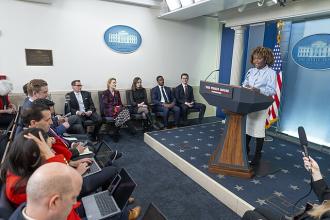Baltimore, MD - Feb. 28, 2020 - The following message was emailed by Rabbi Moshe Hauer today to the members of Bnai Jacob Shaarei Zion:
Friday, February 28, 2020
Dear Friends,
I hope this note finds you all well.
All of us are aware of the current fears regarding the current wave of Coronavirus. It is important for us to pray for all those affected, and for the containment of this virus.
We must also be properly informed and to employ appropriate precautions.
Towards these ends, we are sharing two notes that have been shared nationally: one, encouraging Tefillos; the other, providing basic information and instruction written by Rabbi Dr. Aaron Glatt.
I hope this will be helpful to all of us, and pray that G-d remove this plague from our midst, והסרותי מחלה מקרבך.
Best wishes for a good Shabbos,
Moshe Hauer
Prayers for the Coronavirus
As you are no doubt aware, the spread of Coronavirus has become a global concern that has reached six continents and continues to spread. There is a great deal of uncertainty as to how this virus may spread and as מאמינים בני מאמינים, part of our responsibility is to turn to Hashem in times of crisis such as these.
We have a sacred duty to open our hearts to Hashem to ask for Rachamim on behalf of the people and countries around the world already affected by the virus, and for the containment of the virus’ further spread.
We urge everyone to include tefillot in their prayers for the people in harm's way. In particular, we urge all those lighting Shabbat candles before the advent of this Shabbat to include chapter 130 of Tehillim in their candle lighting recitation.
In addition, we encourage Shuls to insert Tehillim on Friday night between Mincha and Kabbalat Shabbat. The words of the Psalm are below.
Please follow our social media channels or visit OU.org where we will provide updated information.
The leadership of the Rabbinical Council of America and the Orthodox Union express our heartfelt concern and prayers for all of those affected by this virus and we hope for בשורות טובות ישועות ונחמות..
Thank you for joining us in these efforts.
With Gratitude,
Moishe Bane, President
Orthodox Union
Rabbi Daniel Korobkin, President
Rabbinical Council of America
Allen Fagin, Executive Vice President
Orthodox Union
Rabbi Mark Dratch, Executive VP
Rabbinical Council of America
February 28, 2020
ג׳ אדר תש״פ
While the new novel coronavirus, COVID-19, has caused illness that has been widely covered in the news media, and the number of cases worldwide has grown substantially with 80,000+ confirmed cases worldwide in about 40 countries, there are still no confirmed cases of COVID-19 in New York State or the New York metropolitan region. However, with the first case of unclear transmission in the US just described in California, we wanted to update our shul goers.
There are currently no specific recommendations for shuls, although we will continue to update the shul should new information become available.
If you have not traveled to an area where COVID-19 is prevalent or been in close contact with a traveler, and you develop respiratory symptoms, it remains likely that you have a seasonal illness like the flu rather than COVID-19.
At the present time, we urge common-sense and regular hand washing (as appropriate), with soap and water for at least 20 seconds, or with an alcohol-based hand sanitizer if soap and water are not available.
Good personal hygiene practices, including covering coughs and sneezes are also important. To do this optimally, cover your cough or sneeze with a tissue, and then throw the tissue in the trash and wash your hands. If you don’t have a tissue available, cough or sneeze into your elbow.
Other appropriate actions include avoiding touching your eyes, nose and mouth and disinfect objects and surfaces that are frequently handled.
At this time, we do not have a strict recommendation against hand shaking or kissing the sefer Torah or mezzuzos for people who are not at all sick. Use common sense.
The CDC does NOT recommend that people who are well wear a facemask to protect themselves from respiratory illnesses, including COVID-19. Facemasks should only be used by lay people who have symptoms of respiratory diseases, and who must be in public - to help prevent the spread of the disease to others.
Most importantly, several great poskim have personally told me and clearly stated that one must stay home and not go to shul if you are sick with a potentially contagious respiratory illness.
This is a good time to remind everyone that over 30,000,000 people in the US this season have gotten flu, with between 16,000-30,000 deaths, including over 100 children. Flu vaccination is still indicated! By not getting or transmitting flu, you will not only save lives, but you will greatly help doctors who will have less patients to evaluate with unknown respiratory illnesses.
We should make sure there are alcohol-based hand sanitizers in the lobby areas. Custodial staff should be diligently cleaning our shuls and checking dispensers for hand soap and hand sanitizer to ensure that they are filled at all times.
If you recently traveled to a country with ongoing person-to-person transmission of COVID-19: As long as you are asymptomatic, you are probably not a risk to others. However, it is prudent to check your temperature twice a day and monitor for any respiratory symptoms for at least 14 days from the time you left that country. If you have any symptoms or fever, see your doctor as soon as possible, but call the office or center first so they can appropriately isolate you upon entry to the office before they evaluate you.
May our teffilos be accepted by Hashem and may this epidemic soon end.
Rabbi Aaron E. Glatt, MD















